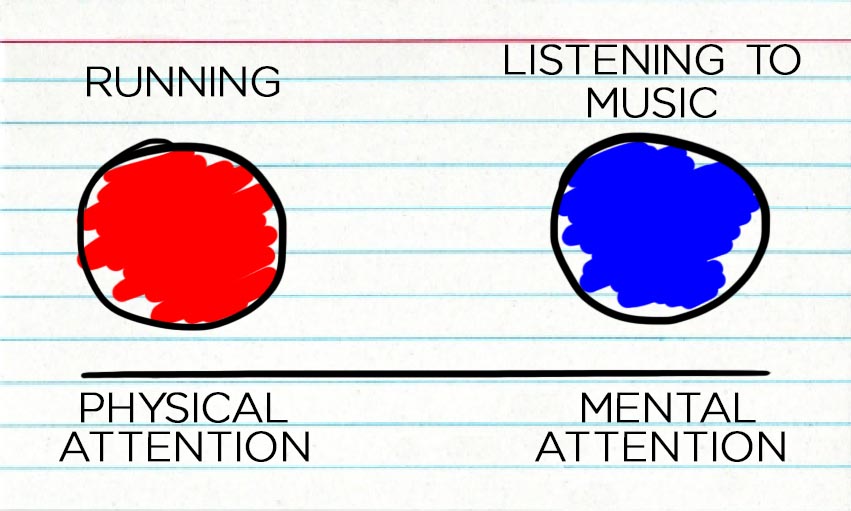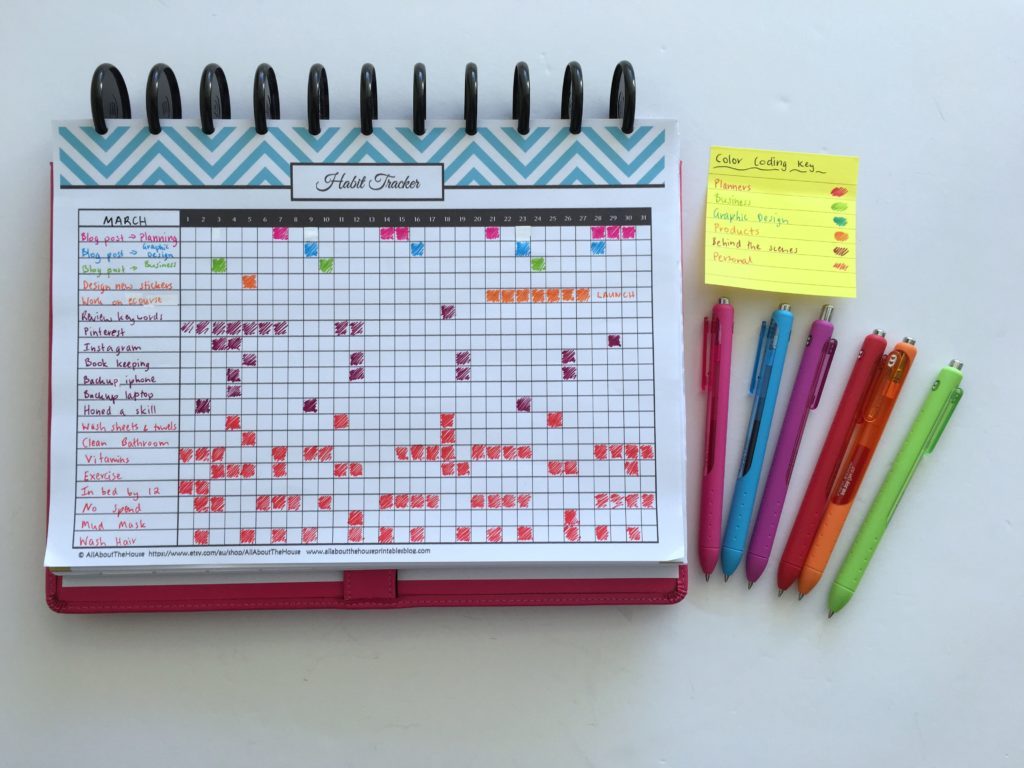Have you ever been through one of those days where nothing seems to get done? You sit to work on a complicated algorithm and just cannot get your mind or the code working. You may be unable to finish a financial report because you are getting distracted by a mind that’s unwilling to do maths at the moment. You start doing your homework, but give up midway.
Similar things happen with physical tasks too. You may not feel like going to the gym after a tired office commute. You feel too lethargic to go to the supermarket and buy the weekly groceries.
How can we get things done with more success rate throughout the day? By planning your day better and scheduling activities such that your mind, body and your environment encourage you to perform your tasks. Here’s how.
Be aware of mental and physical activites
Some activities sap your brain when done long enough, while others sap you of your physical strength. I call them mental and physical activities. Mind you, mental activities do not need to be something as tough as solving a MENSA puzzle or cracking a murder. Likewise, physical activities do not need to be running marathons or workouts in the gym.
A mental task can be something as simple as extracting yellow-coloured buttons from a random pile of coloured buttons. It is mental in the sense that your brain has to look through the buttons, determine the colour and remember to put it in a place determined for yellow buttons. You won’t feel the fatigue for 2 buttons, 10 buttons, even 30 buttons. But do it long enough, say 100 buttons, and your mind will fatigue and begin to drift.
Simple tasks like cleaning your kitchen, walking on the aisles of a shopping mall or hauling things from your home to your car qualify as physical activities. Do them long enough and you will feel some tiredness. In fact, think about doing those tasks when you are feeling lethargic and chances are you won’t even get up to do them.

To increase the chances that you will get things done, you need to be aware of whether your tasks are mental or physical. The nature of the task determines how you should schedule them. Read on to know how.
Find your energy and focus zones
Every human is born different. No schedule can work equal for two persons. In my case, my peak mental focus is before sunrise, between 4:30 am to 6:00 am. After 6 am, I feel the urge to stop sitting at one place and give a workout to my body. I use this for my gym / swimming and breakfast. Afternoon after lunch for me is really drowsy. So I avoid very important mental work. My mental focus completely disappears after 5 pm, so I do not schedule any client work in the evening. But it is good for activities outdoors.
It is not possible to know your focus and energy zones beforehand. You need to go through different types of schedules and see what works best for you. If you are unable to fulfill an activity at a certain time due to lack of focus or energy, try a different block of time from the next day.
Find the right environment
It’s possible that your high focus zone is at 9 am. But does your task require peace and quiet, while it gets noisy at your office at that time? Is it okay for your neighbourhood if you practise your flute at 4 am? Your favourite reading time is 10 pm, but does your spouse go to sleep by 9:30 pm and you cannot keep lights on?
Along with your energy / focus zones, your environment has to support that activity. You have two options. The first option is to change your timing such that the environment becomes supportive. E.g. what if you start working earlier at your office, say 8 am? What if you practise your flute at 7 am? What if you read at 9:00 pm?
But what if change of timings are not possible? You may still not feel perky at 8 am to be able to do office work. Your may want to practise your flute, but you need to go to work like everyone else. So 7 am may be too late. You may have things to do at 9 pm and you may want to read as you lie on bed and go to sleep soon after.
The second option is to move yourself to a conducive environment. I like this option better. You may move to an empty conference room or to a place that you know will be quiet at 9 am. You can build a sound-proof environment at your home for your flute practice. Or move to a public park just outside your neighbourhood. You can read in a room seperate from your bedroom and return to the bedroom when you are sleepy.
Schedule your day

Seriously. I have talked about this in multiple posts on this blog. Here is one about using calendars instead of to-dos. Another one talks about how you should use today to schedule your next day. Really. Your plans for today should have been made yesterday. I have also talked about how you should do just 3 major things every day, spending 600 minutes on them. But not everyone has that kind of time everyday or activities that take so long. So aim for 1 large activity and 2 or 3 smaller activities.
I totally believe that what gets scheduled gets done. I would even go on to say that what gets scheduled gets started. If it is not on your calendar, you may not prioritise it and instead start performing activities that keep you busy, but are not really important.
Alternate between physical and mental tasks
Too often you get mentally fatigued if you perform two mental tasks in a row, e.g. writing an analysis right after reading a long report. Likewise, it becomes hard for you to perform multiple physical tasks in a row. E.g. Going to the gym after completing a long commute from work to home.
To give the brain sufficient time to restore itself and to give the body sufficient rest between activities, you should alternate physical and mental activities. How about going for a run after reading a long report, then coming back and writing the analysis. Then spending some time cleaning your room, followed by studying something, and so on. Your brain and body are used alternatively. One gets to rest, while the other is engaged.
Make it a habit

It is harder to do something if it is a one-time task. Not so if you have already turned something into a habit. If you have to wake up at 4 am on one day because you have a flight to catch, you pull it off with great difficulty. Chances are that you will require further sleep on your commute to the airport or in the plane. But if you wake up at 4 am everyday, your body adjusts and soon thinks that it is normal to wake up at 4 am. Likewise, if go to gym at 5 pm everyday, then it becomes easier to continue that habit. The more you stick to your schedule and reinforce a habit, the easier the scheduled task becomes.
Do not resort to comfort activities as an escape

Comfort activities are activities that you resort to when you are tired of, bored of or overwhelmed by your task at hand. It is common to put away a difficult algorithm in a program and switch to Facebook binging instead. It is quite easy to shirk cleaning your kitchen and instead watch TV. Twitter, WhatsApp and news take away more chunks of your time.
I am not against comfort activities. But just like your regular tasks, you should do them strictly to a schedule. E.g. Priya and I watch movies only over dinner and only during weekends. We watch videos on YouTube only during lunch time.
Both the brain and the body have a way of escaping difficult things that need to be done. It is not advisable to give into those urges. If you are really struggling to complete your current task, then maybe it is time to begin your next task and postpone your current task for later. E.g. if your are having trouble completing your algorithm, then maybe it is time to take a break from the intense mental activity and switch to another task that needs to get done, but uses more body than brain, e.g. the grocery shopping that you have scheduled later today.
Track your progress
This process sounds too simplistic. But the simple act of tracking what you completed and did not, helps you in several ways. Here are some advantages of tracking your day.
- You will get to feel good about what you achieved.
- You will become aware of things you miss.
- On review, you will also know why you missed certain activities. They may be due to low energy or focus, unconducive environment or lack of knowledge or tools. In that case, you know that you need adjustments before that task can be fulfilled. You may have to shift that task to a high focus / energy zone. You may need to change where you are working on that task or who you are working with. If you were unable to complete a task due to lack of knowledge or tools, then you need to acquire them first.
Sometimes a task is unfinished simply because life happened. Guests arrived or someone got sick, etc. In that case, you just need to reschedule the task to a suitable day and time. - If the task is a habit, tracking will help you check how often you have successfully stuck to the habit.
Tracking can be simple as a daily journal, a progress bar or just coloured circles on a page showing activities you completed and those you missed.
Conclusion
Getting your tasks for the day done is not rocket science. But it is not easy either. Even I have a success rate of around 80 – 90%, where I miss at least one or two scheduled tasks every week. But not more. Hopefully, my tips will allow you to build a system where you get more done every day.

Great tips on balancing the tasks based on energy levels. A very unique way to handle daily chores/activities.
Indeed… I learnt it from different sources, mainly Daniel Pink. I tried it and it worked great. Our house cleaning is the best example, when we shifted it from 1 pm to 7:30 am.